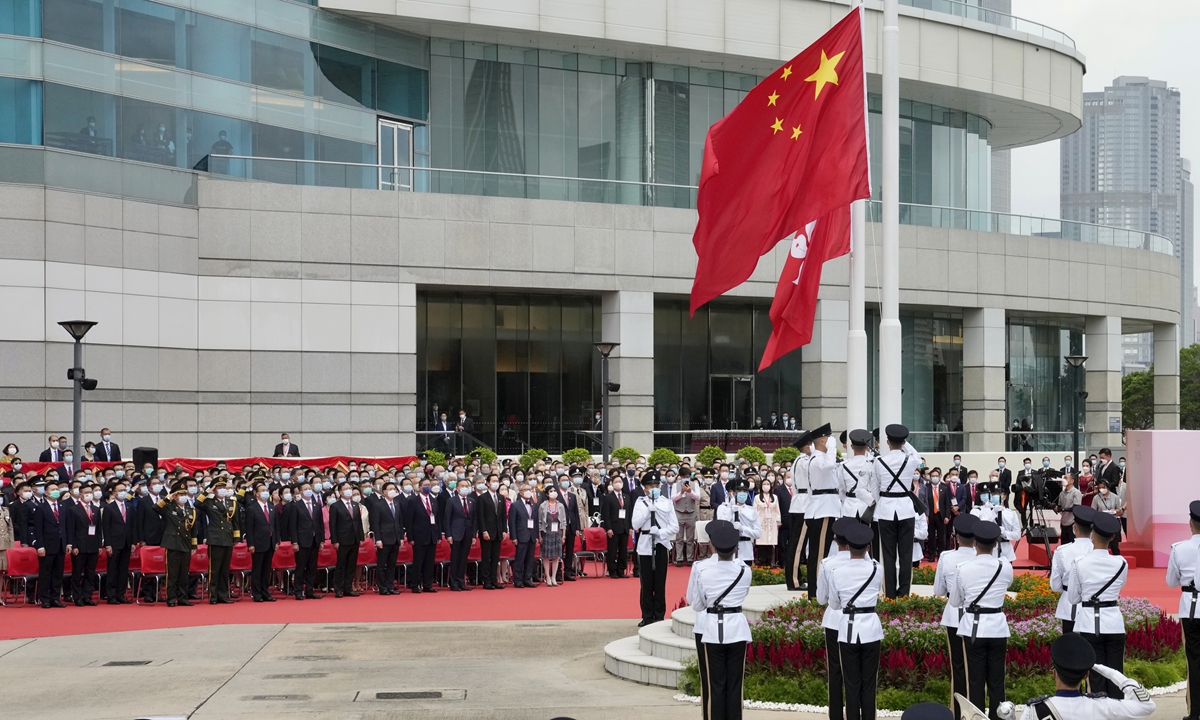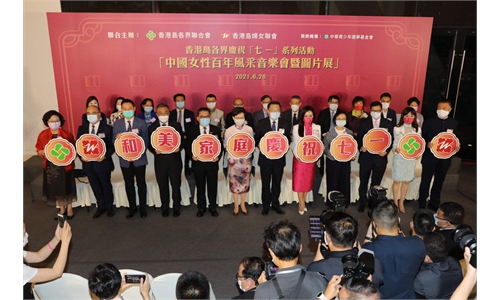Central govt's full jurisdiction over HK, Macao highlighted in Xi's speech
Central govt's full jurisdiction over Hong Kong, Macao highlighted in Xi's speech

Officials from the Hong Kong Special Administrative Region attend a flag-raising ceremony at the Golden Bauhinia Square on Thursday to celebrate the 24th anniversary of the city's return to the motherland. Thursday also marked the 100th anniversary of the founding of the Communist Party of China. Photo: VCG
Xi Jinping, general secretary of the Communist Party of China (CPC) Central Committee, said Thursday that we will stay true to letter and spirit of the principle of "one country, two systems," ensuring that the central government exercises overall jurisdiction over Hong Kong and Macao, and implement the legal systems and enforcement mechanisms for the two special administrative regions (SARs) to safeguard national security while protecting China's sovereignty, security and development interests.
Attending a grand ceremony to celebrate the 100th anniversary of the CPC, Xi, also Chinese president and chairman of the Central Military Commission, sounded a strong alarm to secessionists and forces behind them, vowing to take resolute action to utterly defeat any attempt toward "Taiwan independence," which was echoed by seas of cheers and applause from the audience at Tiananmen Square.
By integrating the fundamentals of the "one country, two systems" policy with new understanding about the evolving situation in Hong Kong and Macao, Xi's focus on the full jurisdiction of the central government over the two SARs stemmed from the experience accumulated during the process of practicing the policy in those two Chinese cities.
This basic state policy has been enriched to provide backbone support for solving the Taiwan question in the near future, some experts said.
We will stay true to the letter and spirit of the principle of "one country, two systems," under which the people of Hong Kong administer Hong Kong, and the people of Macao administer Macao, both with a high degree of autonomy, Xi said, noting that we will ensure the central government exercises overall jurisdiction over the two cities, and implementing the legal systems and enforcement mechanism for the two SARs to safeguard the sovereignty, security and interests of the country's development as well as the social stability and prosperity of Hong Kong and Macao, Xi said.
Over the past two years, particularly in Hong Kong, there were severe problems endangering national security. B Summarizing Macao's experience, the central government has pushed forward the establishment of the legal and execution systems of safeguarding national security in Hong Kong, Li Xiaobing, an expert on Hong Kong affairs at Nankai University in Tianjin, told the Global Times on Thursday.
"What we emphasize more now is to take sovereignty, national security and the interests of development as a whole… Hong Kong and Macao sit at the frontline of the country in getting along relations with the world, and we must draw up a system and legal bottom line on the national security issue," Li said.
It is not a new thing to mention the full jurisdiction of the central government over Hong Kong. A white paper issued in June 2014 on the practice of "one country, two systems" pointed out that the central government has full jurisdiction, including power executed by the central government directly or power delegated to the Hong Kong authorities in accordance with the law.
The full jurisdiction has become a baseline for the central government in governing the two SARs and coming up with relevant legislative and systemic arrangements, Tian Feilong, an associate professor at Beihang University's law faculty, told the Global Times on Thursday.
Over the past year, the implementation of the national security law for Hong Kong, and electoral reform in ensuring the principle of only patriots governing Hong Kong, were dedicated to meet the goal of safeguarding the sovereignty, security and interests of the country's development as a whole in Hong Kong, and safeguarding national security is also the fundamental responsibility of the central government, Tian said.
"The enriched 'one country, two systems' principle also boosted confidence in exploring the basic policy for the island of Taiwan in aiming at reunification as a historical task," Tian added.
Xi said during the speech that solving the Taiwan question and completing reunification are historic mission and an unshakable commitment of the CPC. Cheers and shouts pushed the ceremony to another climax when Xi said "no one should underestimate the resolve, the will and the ability of the Chinese people to defend their national sovereignty and territorial integrity."
It served as another clear, decisive message from the Chinese top leader to secessionists in the island as well as any external forces behind them, experts said, as such a strong reaction from the audience also showed that reunification is an inevitable trend, based on the collective will of the Chinese people.
"After years of preparation and development, we can see that the reunification process has entered a countdown period," Li said, noting that it's also an important target for the CPC, which will strive to achieve it generation by generation.
Some residents and scholars in Hong Kong told the Global Times that they were thrilled when they listened to Xi's speech, which was powerful, encouraging and full of confidence.
"Meanwhile, people can't lower their guard. When the country has entered a new phase of development, it may trigger concern, fear and envy in the US-led West, which would seek to contain its rise jointly," Lau Siu-kai, a vice head of the Chinese Association of Hong Kong and Macao Studies, told the Global Times.
"Besides the review of the significant achievements made by the CPC over the past 100 years, the speech made us think about the obstacles that lie ahead, especially external forces, when confronting new challenges and safeguarding national security," Lau said.



